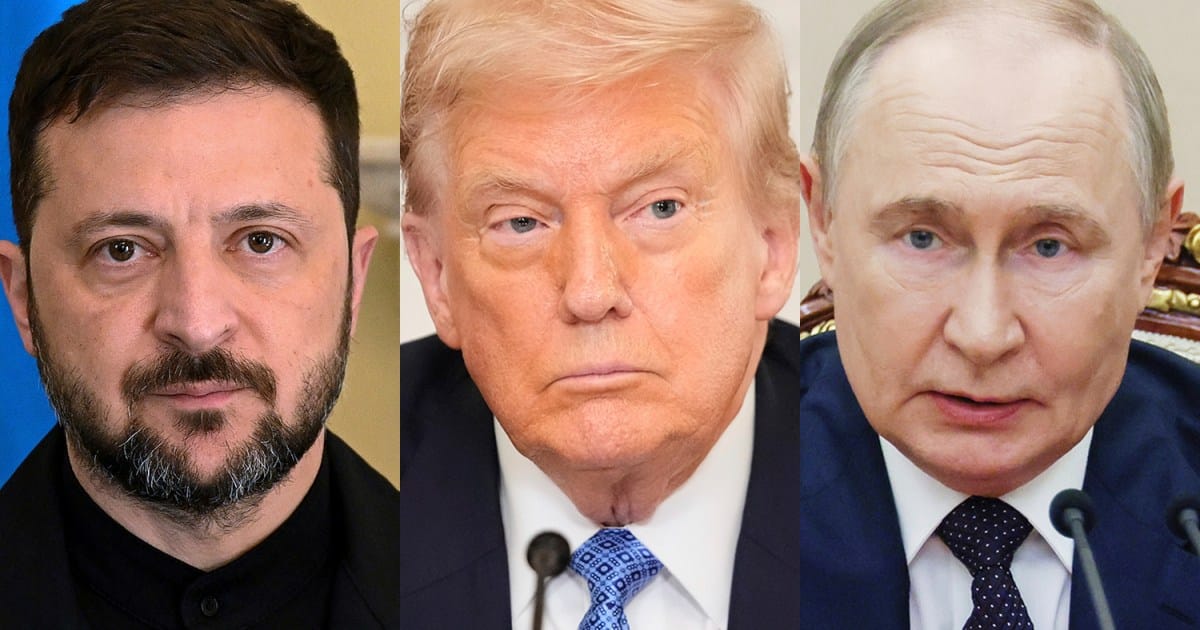German chancellor has arranged a series of meetings, beginning with European leaders and followed by a call with the US president.
Ukrainian President Volodymyr Zelenskyy will travel to Berlin for talks with German Chancellor Friedrich Merz, European leaders and top United States officials ahead of a planned summit between US President Donald Trump and Russian President Vladimir Putin later this week.
Both the German and Ukrainian governments confirmed the visit on Wednesday, which comes as Kyiv and its European allies push to ensure their voices are heard in discussions about ending the war.
Merz has arranged a series of virtual meetings, beginning with European leaders and followed by a call with Trump and US Vice President JD Vance about an hour later.
The day will conclude with a separate discussion among leaders of the so-called “coalition of the willing” – an assemblage of Western countries allied with Ukraine.
At a news briefing on Wednesday, Merz also pledged to help Ukraine develop long-range missile systems without Western-imposed restrictions on their use or targets.
Trump to meet Putin
Trump has described Friday’s summit with the Russian leader in Alaska as “a feel-out meeting” to gauge whether Putin is serious about ending the conflict.
But he has unsettled European allies by suggesting Ukraine will have to give up some Russian-held territory and by floating the idea of land swaps, without specifying what Moscow might surrender.
European governments have insisted Ukraine must be part of any peace negotiations, warning that excluding Kyiv could benefit Moscow.
On Monday, Trump declined to commit to pushing for Zelenskyy’s participation in his talks with Putin, saying a meeting between himself, Putin and Zelenskyy could be arranged afterwards.
Zelenskyy claimed he rejected an offer on Tuesday that Putin had proposed, where Ukraine would withdraw from the 30 percent of the Donetsk region it still controls as part of a ceasefire deal.
Kyiv and European officials fear that any US–Russia agreement reached without them could legitimise Moscow’s seizure of Ukrainian territory – including Donetsk, Luhansk, Zaporizhia and Kherson – four regions which are partly occupied by Russia.
Russia’s Ministry of Foreign Affairs on Wednesday said Trump and Putin would discuss “all the accumulated issues” at the meeting.
Foreign Ministry spokesperson Alexei Fadeev also said that consultations requested by European countries were “insignificant”.
Russia’s position on ending its war on Ukraine was set out by President Vladimir Putin in June 2024 and has not changed, he added. Putin at that time demanded a full Ukrainian withdrawal from the four regions of the country that Russia has claimed as its own territory but does not fully control.
Fighting continues in eastern Ukraine
Meanwhile, fighting continues along the front line, with the General Staff of the Ukrainian Armed Forces reporting 165 clashes with Russian forces over the past day, with the heaviest fighting in the Pokrovsk, Novopavlivka and Lyman sectors.
In the Kherson region, Russian forces used a drone to strike a civilian car on the Novoraisk–Kostyrka highway, killing a man and a woman, according to regional governor Oleksandr Prokudin on Telegram.
The Russian Defence Ministry said its air defences destroyed 46 Ukrainian drones overnight across Russian territory and the Sea of Azov.
Debris from intercepted drones fell on the roof of an apartment block in the southern city of Volgograd and in the yards of four residential buildings in Slavyansk-on-Kuban.
The AFP news agency has also reported that Ukraine is continuing to lose more ground, with evacuations in Bilozerske, while Ukrainian battlefield monitoring group DeepState reported that Russian forces had advanced in Nikanorivka, Shcherbynivka and near Petrivka in the Donetsk region.
Meanwhile, the Ukrainian General Staff said its forces were engaged in “difficult” fighting near Pokrovsk in Donetsk, a key logistical hub for Kyiv’s forces, whose capture would deal a significant blow to its front-line defences and prospects at securing a favourable peace deal with Russia.
